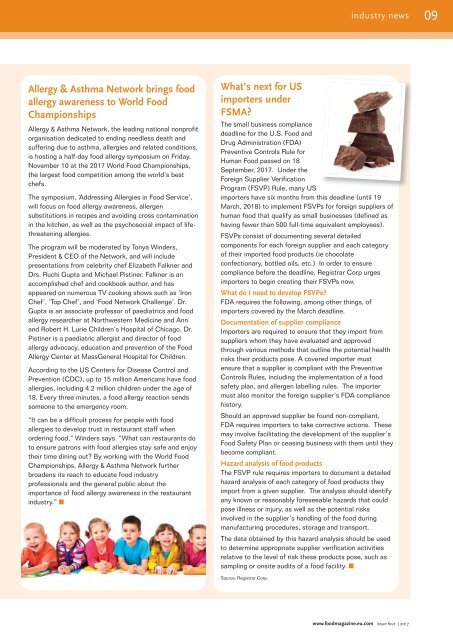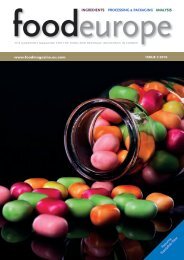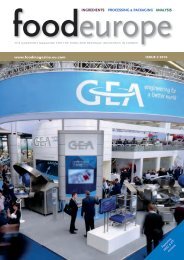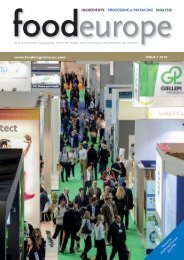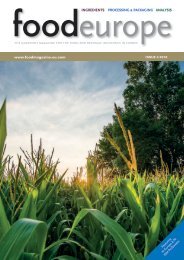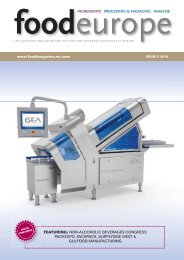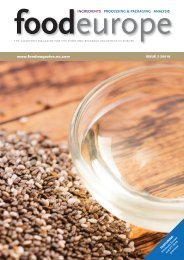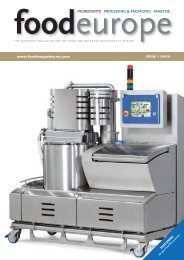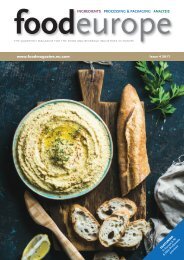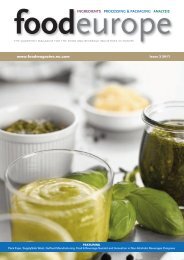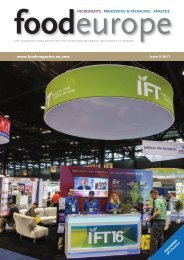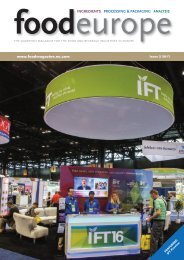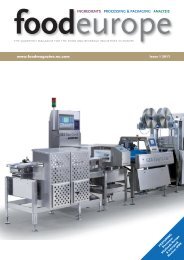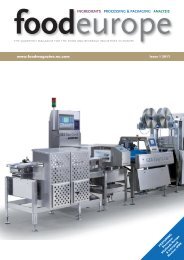Issue_4_2017
Create successful ePaper yourself
Turn your PDF publications into a flip-book with our unique Google optimized e-Paper software.
industry news<br />
09<br />
Allergy & Asthma Network brings food<br />
allergy awareness to World Food<br />
Championships<br />
Allergy & Asthma Network, the leading national nonprofit<br />
organisation dedicated to ending needless death and<br />
suffering due to asthma, allergies and related conditions,<br />
is hosting a half-day food allergy symposium on Friday,<br />
November 10 at the <strong>2017</strong> World Food Championships,<br />
the largest food competition among the world’s best<br />
chefs.<br />
The symposium, ‘Addressing Allergies in Food Service’,<br />
will focus on food allergy awareness, allergen<br />
substitutions in recipes and avoiding cross contamination<br />
in the kitchen, as well as the psychosocial impact of lifethreatening<br />
allergies.<br />
The program will be moderated by Tonya Winders,<br />
President & CEO of the Network, and will include<br />
presentations from celebrity chef Elizabeth Falkner and<br />
Drs. Ruchi Gupta and Michael Pistiner. Falkner is an<br />
accomplished chef and cookbook author, and has<br />
appeared on numerous TV cooking shows such as ‘Iron<br />
Chef’, ‘Top Chef’, and ‘Food Network Challenge’. Dr.<br />
Gupta is an associate professor of paediatrics and food<br />
allergy researcher at Northwestern Medicine and Ann<br />
and Robert H. Lurie Children’s Hospital of Chicago. Dr.<br />
Pistiner is a paediatric allergist and director of food<br />
allergy advocacy, education and prevention of the Food<br />
Allergy Center at MassGeneral Hospital for Children.<br />
According to the US Centers for Disease Control and<br />
Prevention (CDC), up to 15 million Americans have food<br />
allergies, including 4.2 million children under the age of<br />
18. Every three minutes, a food allergy reaction sends<br />
someone to the emergency room.<br />
“It can be a difficult process for people with food<br />
allergies to develop trust in restaurant staff when<br />
ordering food,” Winders says. “What can restaurants do<br />
to ensure patrons with food allergies stay safe and enjoy<br />
their time dining out? By working with the World Food<br />
Championships, Allergy & Asthma Network further<br />
broadens its reach to educate food industry<br />
professionals and the general public about the<br />
importance of food allergy awareness in the restaurant<br />
industry.” ■<br />
What’s next for US<br />
importers under<br />
FSMA?<br />
The small business compliance<br />
deadline for the U.S. Food and<br />
Drug Administration (FDA)<br />
Preventive Controls Rule for<br />
Human Food passed on 18<br />
September, <strong>2017</strong>. Under the<br />
Foreign Supplier Verification<br />
Program (FSVP) Rule, many US<br />
importers have six months from this deadline (until 19<br />
March, 2018) to implement FSVPs for foreign suppliers of<br />
human food that qualify as small businesses (defined as<br />
having fewer than 500 full-time equivalent employees).<br />
FSVPs consist of documenting several detailed<br />
components for each foreign supplier and each category<br />
of their imported food products (ie chocolate<br />
confectionary, bottled oils, etc.) In order to ensure<br />
compliance before the deadline, Registrar Corp urges<br />
importers to begin creating their FSVPs now.<br />
What do I need to develop FSVPs?<br />
FDA requires the following, among other things, of<br />
importers covered by the March deadline.<br />
Documentation of supplier compliance<br />
Importers are required to ensure that they import from<br />
suppliers whom they have evaluated and approved<br />
through various methods that outline the potential health<br />
risks their products pose. A covered importer must<br />
ensure that a supplier is compliant with the Preventive<br />
Controls Rules, including the implementation of a food<br />
safety plan, and allergen labelling rules. The importer<br />
must also monitor the foreign supplier’s FDA compliance<br />
history.<br />
Should an approved supplier be found non-compliant,<br />
FDA requires importers to take corrective actions. These<br />
may involve facilitating the development of the supplier’s<br />
Food Safety Plan or ceasing business with them until they<br />
become compliant.<br />
Hazard analysis of food products<br />
The FSVP rule requires importers to document a detailed<br />
hazard analysis of each category of food products they<br />
import from a given supplier. The analysis should identify<br />
any known or reasonably foreseeable hazards that could<br />
pose illness or injury, as well as the potential risks<br />
involved in the supplier’s handling of the food during<br />
manufacturing procedures, storage and transport.<br />
The data obtained by this hazard analysis should be used<br />
to determine appropriate supplier verification activities<br />
relative to the level of risk these products pose, such as<br />
sampling or onsite audits of a food facility. ■<br />
Source: Registrar Corp.<br />
www.foodmagazine.eu.com issue four | <strong>2017</strong>


